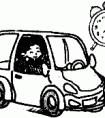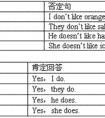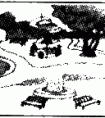句型转换。1. The children are playing in the park. (单数句型)_____________________________________________________________2. The birds are singing in the tree-六年级英语
题文
| 句型转换。 |
| 1. The children are playing in the park. (单数句型) _____________________________________________________________ 2. The birds are singing in the trees. (一般疑问句) _____________________________________________________________ 3. I will go to the park. (用be going to句型改写) _____________________________________________________________ 4. The girls are going to have a picnic in the park. (对划线部分提问) _____________________________________________________________ 5. We're going to go to school at eight o'clock. (对划线部分提问) _____________________________________________________________ 6. These dogs are very noisy. (否定句) _____________________________________________________________ |
答案
| 1. The child is playing in the park. 2. Are the birds singing in the trees? 3. I'm going to go to the park. 4. Where are the girls going to have a picnic? 5. When are you going to go to school? 6. This dog is very noisy. |
据专家权威分析,试题“句型转换。1. The children are playing in the park. (单数句..”主要考查你对 单数名词,疑问副词,系动词,一般将来时,否定句 等考点的理解。关于这些考点的“档案”如下:
单数名词疑问副词系动词一般将来时否定句
考点名称:单数名词
单数名词:
主要用来表示“一个”东西的概念。两个及其以上就应用复数名词来描述。
例如单数可数名词:man,river,book,glass,desk,cup,road,car,eye,foot,tree,bird,girl,boy英语上名词按可数与否可分为可数名词和不可数名词。
可数名词按数目又可分为单数名词和复数名词两类。
注意:不可数名词没有复数形式,如water(水)。
考点名称:疑问副词
- 疑问副词:
用来引导特殊疑问句,表示时间,地点,方式,原因等,常见的有:when,where,how,why等。
分类:
时间副词:now, then, yesterday, always, already, soon
地点副词:here, home, upstairs, nowhere, above, near, beyond
方式副词:多数是形容词加上ly构成的,和一些well, fast, quick, slow, hard, alone, straight, wide
在加词尾ly时要注意:
(1)辅音+le:simple→simply, gentle→gently,
(2)以ic结尾的词:classic→classical但是public→publicly
(3)以辅音读音是[i]的y结尾的词:easy→easily
(4)特例:full→fully, whole→wholly, true→truly
程度副词,连接副词,关系副词
much, enough, quite, hardly, almost, deeply
疑问副词连接副词,关系副词:
how,who,where - 疑问副词在句中的位置及用法举例:
由于疑问副词后接疑问句,因此这些副词一般都位于句首。例如:
How do you go to school? 你怎么去上学?
Why do you dislike the game? 为什么你不喜欢这个游戏? - 疑问代词和疑问副词区别:
1. 疑问代词做对陈述句的主语,宾语或定语提问,即做句子的主语,宾语或定语, 如:
what, who/ whom, whose.
eg. Who is talking ?
What can you see?
Whose shirt is this?
2.疑问副词对时间,地点,方式等状语提问,如:
when, where, how 等.
eg. When is your birthday?
Where are you going?
How do you know?
考点名称:系动词
- 系动词:
亦称连系动词,作为系动词,它本身有词义,但不能单独用作谓语,后边必须跟表语,亦称补语(形容词),构成系表结构说明主语的状况、性质、特征等情况。
be(是)是最基本的系动词。小学涉及到的系动词需要掌握的am, is, are
如:I am from Beijing. 我来自北京。
My mother is a teacher. 我的妈妈是一位老师。
除了系动词be,常用的系动词还有look(看起来)、sound(听起来)、feel(感觉到)、become(变成)、smell(闻起来)等。
例:The boy looks very happy. 这个男孩看起来很高兴。
The dish smells good. 这盘菜闻起来很香。 be动词意思和用法:
一般的意思是:
是,此种用法,有多种变化形式,is,am,are,was,were,being,been,to be.
另外,be动词还有成为的意思。
根据句子中不同的人称、数和时态,应该选择相应的be动词。<?xml:namespace prefix = "o" ns = "urn:schemas-microsoft-com:office:office" />要看句语的时态:
如果是一般过去时,就用was/were
如果是一般现在时,就用am/is/are
如果是一般将来时,就用will be
然后看主语的人称及复数形式:
一般过去时:
第一人称和第三人称的单数形式,则用was
第一人称和第二人称、第三人称的复数,则用were
一般现在时:
第一人称单数形式,用am
第三人称单数形式,用is
第一人称复数、第二人称、第三人称的复数形式,则用are
一般将来时:
- 最新内容
- 相关内容
- 网友推荐
- 图文推荐
| [家长教育] 孩子为什么会和父母感情疏离? (2019-07-14) |
| [教师分享] 给远方姐姐的一封信 (2018-11-07) |
| [教师分享] 伸缩门 (2018-11-07) |
| [教师分享] 回家乡 (2018-11-07) |
| [教师分享] 是风味也是人间 (2018-11-07) |
| [教师分享] 一句格言的启示 (2018-11-07) |
| [教师分享] 无规矩不成方圆 (2018-11-07) |
| [教师分享] 第十届全国教育名家论坛有感(二) (2018-11-07) |
| [教师分享] 贪玩的小狗 (2018-11-07) |
| [教师分享] 未命名文章 (2018-11-07) |






